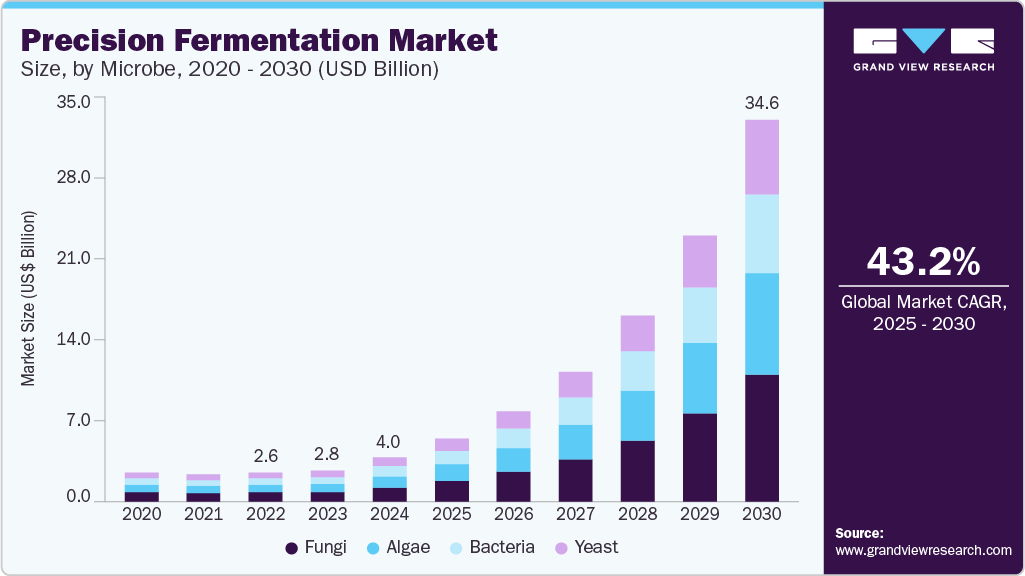Precision Fermentation Industry Overview
Imagine a world where the everyday products one relies on, from the food on the plates to the medicines in the cabinets, are created with unprecedented precision and sustainability. This is not science fiction; it is the burgeoning reality of the Precision Fermentation Market, where cutting-edge science meets supportive regulation to unlock a universe of possibilities.
For years, fermentation has been a cornerstone of human civilization, transforming simple ingredients into life-sustaining foods and beverages. Currently, technological advancements are taking this ancient process to revolutionary new heights. Think of it as upgrading from traditional brewing to a highly sophisticated, bio-manufacturing powerhouse.
CRISPR-Cas9: The Precision Scalpel for Microbes
At the heart of this revolution lies the power of precise genetic modification. Tools like CRISPR-Cas9 act as molecular scissors, allowing scientists to make incredibly accurate changes to the DNA of microorganisms – the tiny but mighty workhorses in the fermentation process. This precision enables people to:
- Optimize Production: It engineers microbes to produce target molecules with greater efficiency, speed, and yield, reducing costs and increasing scalability.
- Enhance Functionality: Precision fermentation designs microorganisms to create novel proteins, enzymes, and other compounds with tailored properties for specific applications.
- Unlock New Pathways: It enables the production of complex molecules that were previously difficult or impossible to obtain through traditional methods.
This level of control is a game-changer, moving beyond the inherent variability of traditional fermentation and paving the way for consistent, high-quality production of a vast array of products.

Beyond Food: Exploring New Frontiers
While early successes in precision fermentation have focused on food ingredients like alternative proteins and dairy, the scientific community is relentlessly pushing the boundaries. Researchers
zare actively exploring and demonstrating the potential of fermentation-derived products in exciting new sectors:
- Pharmaceuticals: Imagine producing complex therapeutic proteins, antibodies, and even vaccines with greater efficiency and purity. Precision fermentation offers the potential for more accessible and affordable medicines. Researchers are exploring using engineered yeast to produce insulin, a critical hormone for diabetes management.
- Advanced Materials: From sustainable bioplastics and textiles to high-performance adhesives and coatings, fermentation can be harnessed to create environmentally friendly alternatives to traditional, resource-intensive materials. BIO published an article on February 5, 2025, discussing synthetic spider silk produced via precision fermentation. Its strength, flexibility, and biodegradability suit it for textiles, medical equipment, and aerospace. 21st.BIO has collaborated with AMSilk to scale production and expand its applications.
- Cosmetics and Personal Care: Precision fermentation can yield novel ingredients with specific functionalities, such as moisturizing agents, antioxidants, and even sustainable pigments, offering consumers more ethical and effective beauty solutions.
- Specialty Chemicals: Engineered microorganisms can produce greater purity and sustainability of enzymes, flavor compounds, and fragrances, influencing various industrial processes.
This continuous exploration, fueled by scientific curiosity and ingenuity, constantly expands the precision fermentation application landscape, driving market growth and innovation.
Gather more insights about the market drivers, restraints, and growth of the Precision Fermentation Market
Regulatory Support: Cultivating Innovation and Trust
As with any transformative technology, supportive and adaptive regulatory frameworks are crucial for the responsible and widespread adoption of precision fermentation. Governments and regulatory bodies worldwide increasingly recognize this field's potential to contribute to sustainability goals, food security, and economic growth.
Clear guidelines and streamlined approval processes can:
- Foster Investment: Guidelines can provide certainty for companies investing in research, development, and scaling up production.
- Ensure Safety and Transparency: Regulatory support tends to build consumer trust by establishing robust safety assessments and labeling standards.
- Promote Innovation: It can create an environment where researchers and companies are encouraged to explore new applications and push technological boundaries.
Collaborative dialogues between regulators, industry stakeholders, and the scientific community are essential to create a regulatory landscape that is both enabling and protective.
A Win-Win for End Users
The precision fermentation market was estimated at USD 4.01 billion in 2024, growing at a compound annual growth rate (CAGR) of 43.2% from 2024 to 2030. The advancements in precision fermentation, coupled with supportive regulations, translate into significant benefits for various end users:
- Consumers: Consumers can access more sustainable, ethical, and potentially healthier products, from plant-based alternatives with improved taste and texture to innovative pharmaceuticals and cosmetics.
- Food Industry: The food industry gains access to novel ingredients that enhance product quality, nutritional value, and sustainability profiles. Imagine dairy-free cheese produced through fermentation with the same melt and stretch as traditional cheese.
- Pharmaceutical Companies: Pharmaceutical companies can potentially produce life-saving drugs more efficiently and cost-effectively, improving patient access worldwide.
- Materials Science Sector: These sectors can leverage bio-based materials with tailored properties, reducing reliance on fossil fuels and contributing to a circular economy.
- Environment: Benefits from more sustainable production methods that reduce land use, water consumption, and greenhouse gas emissions compared to traditional agriculture and manufacturing bode well for the market growth.
Brewing a Brighter Future
The precision fermentation market is more than just a technological trend; it is a paradigm shift in producing essential goods. The synergy between scientific breakthroughs and forward-thinking regulatory support creates a powerful innovation, sustainability, and economic growth engine. As scientists continue to explore the vast potential of engineered microorganisms and as regulations adapt to foster responsible development, one can look forward to a future where fermentation-derived products play an increasingly vital role in shaping a healthier and more sustainable world for all. The revolution has begun, and it is brewing up something truly extraordinary.
Order a free sample PDF of the Market Intelligence Study, published by Grand View Research.

No comments:
Post a Comment